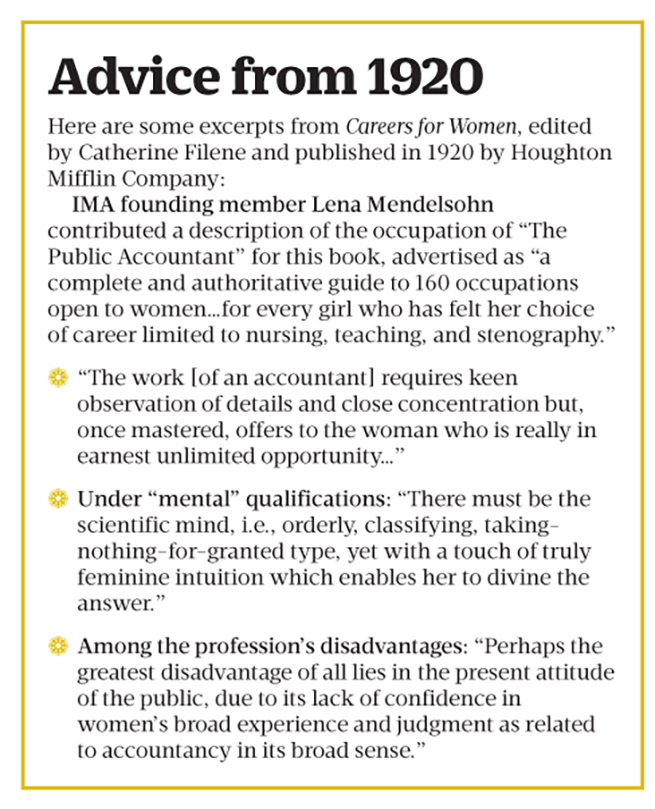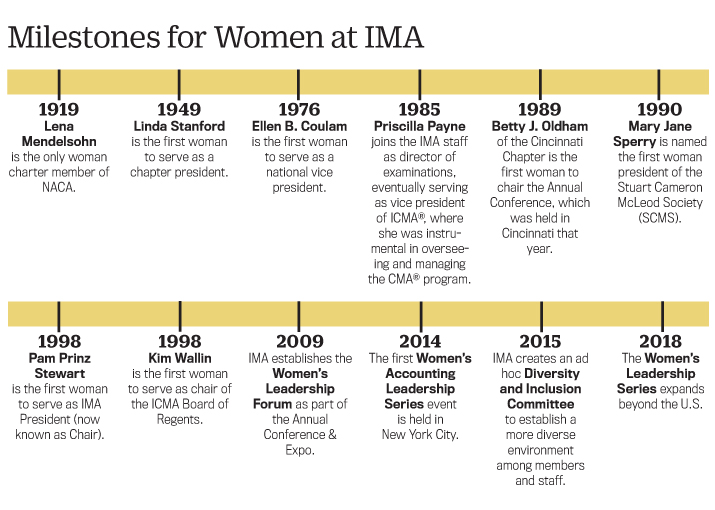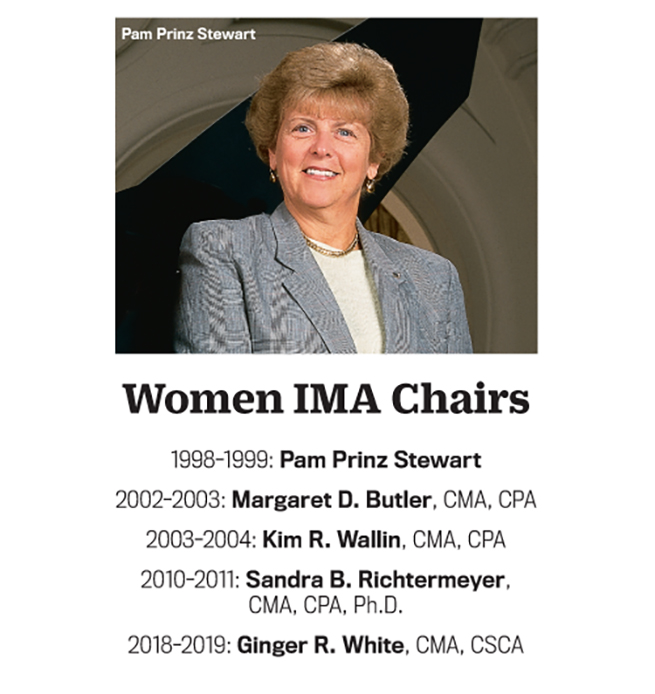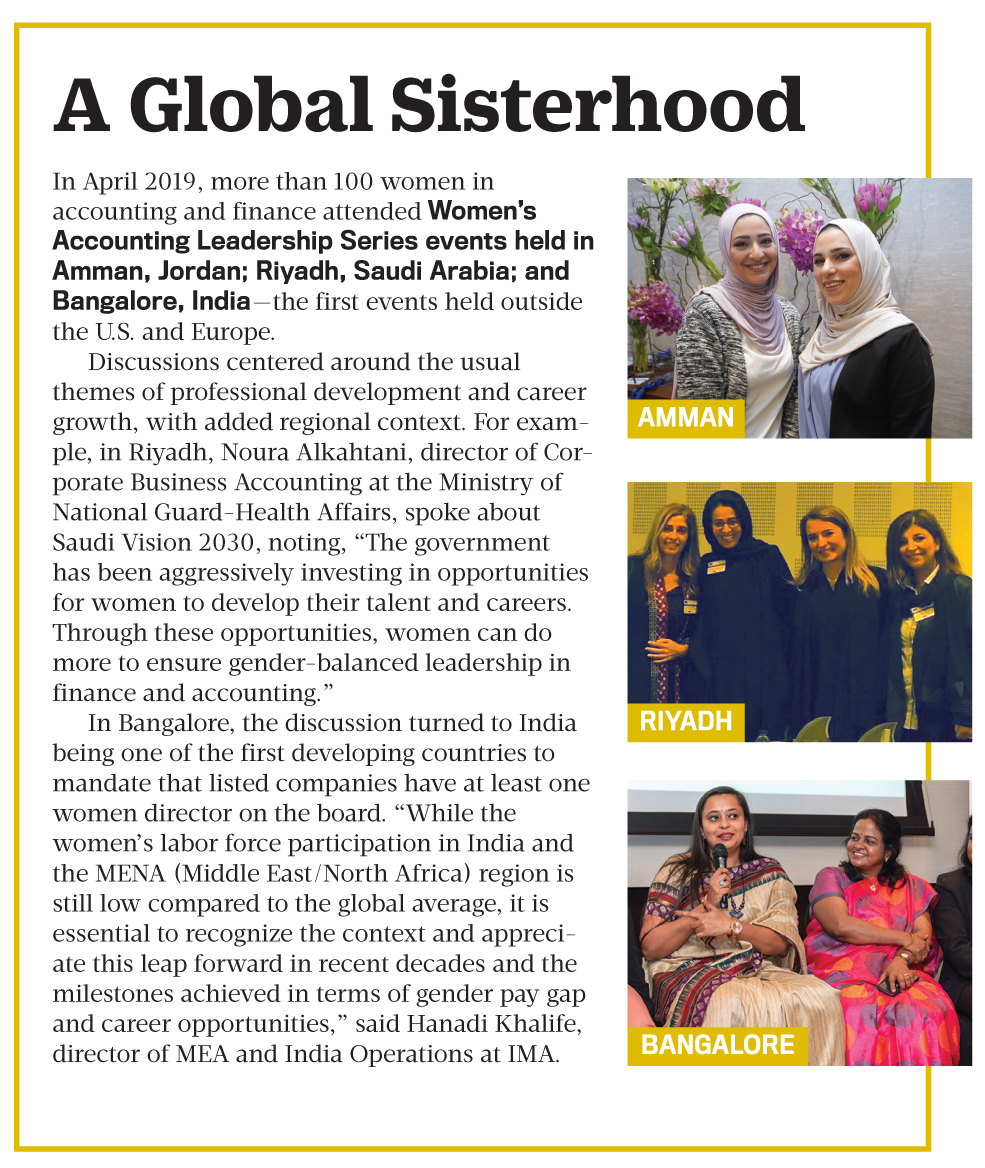The woman is Lena Mendelsohn, a well-known CPA (Certified Public Accountant) from Boston, Mass.; owner of her own firm, L.E. Mendelsohn & Co.; and the association’s only woman charter member (the founding members photo also includes another woman, unidentified, who most likely is a spouse or secretary). As described in IMA’s 75th Anniversary history book, Proud of the Past, “[Mendelsohn] recognized what role that cost accounting would play in the nation’s future, so she accepted Major Nicholson’s invitation to the organizational meeting in Buffalo in October, 1919.”
Mendelsohn enjoyed a prominent position in the profession, but she was an outlier. When NACA was founded in the early 20th Century, very few women practiced accounting, and, accordingly, very few women were eligible to join the association. The numbers tell the story: Until 1944, fewer than 200 women in the United States. had earned their CPA. This is significant because CPAs were the primary source of membership during the association’s early years. That the association had one female founding member—even before the passage of the 19th Amendment giving women the right to vote—is astounding.

Over the years, the influence of women has ballooned, both in terms of IMA membership and within the profession. In fact, as more women entered the profession, a proportional number of them also joined NACA and then the National Association of Accountants (NAA): By 1994, women comprised fully one-third of the membership. Today, 46% of IMA members are women, essentially mirroring employment trends (according to statistics gathered by Catalyst, women also comprise about 50% of the profession in the U.S.).

STEADY PROGRESS
Membership is one thing, but leadership is another. It took until 1949 for a woman to assume a significant leadership role: Linda Stanford served as the first woman chapter president, and in 1963 she was the first woman to serve at the national level as a member of the Board of Directors.

Both moves were groundbreaking. Noted Pam Prinz Stewart, the first woman IMA Chair, “The accounting world was almost 100% men, not just 100 years ago but even 40 years ago. This didn’t change until the 1970s when women began to be regarded as ‘professional’ accountants and not just bookkeepers.”
Prinz Stewart forged her own path. She contributed as a prominent member of her local chapter and council leadership in the 1970s and 1980s, a time when women were increasingly serving in these posts and at the global level as well. In this climate, she was invited to become IMA Chair (or President, as the position was known at the time). She wasn’t the first to be asked. “I know that several other women had been asked before me, but they declined. Still, it had been 80 years since the association’s founding, and it seemed about time to change that,” she said. Fortunately, Prinz Stewart worked at Robert Half, which recognized the advantages of having a woman at the volunteer helm of IMA. They enthusiastically supported her taking the role, which she did.
Prinz Stewart served from 1998 to 1999, the first of now five women to hold IMA’s highest volunteer position. The others are Sandra B. Richtermeyer (academia), Kim R. Wallin (public accounting and public service), and Margaret D. Butler and Ginger R. White (corporate America). Wallin is a groundbreaker of her own: She’s the first (and only) Chair who was nominated from the floor, a path she decided to pursue to challenge a nominating process that she believed was flawed. “I really believed that our top leadership needed to better represent the changing demographics of our membership and our profession so that we could attract a group of more diverse members,” she explained.
AN EXCHANGE OF IDEAS
IMA’s commitment to its women members has evolved rapidly over the past decade, beginning with the Women’s Leadership Forum, offered as part of the IMA Annual Conference & Expo in 2009 and led by Richtermeyer, at the time IMA Chair-Elect and now dean of the Manning School of Business at the University of Massachusetts Lowell.
“The first incarnation was casual, just a roundtable gathering really, but by the second year, we had a panel of speakers, including Sandy, myself, Pam Prinz Stuart, Sue Bos, and Ashley Gibson,” Wallin said. Bos, current president of the Stuart Cameron McLeod Society (SCMS), member and past chair of the IMA Committee on Ethics, and longtime volunteer leader, recalls that meeting: “The Forum was open to all Conference attendees, and it really got the conversation started about developing leadership skills and sharing strategies for success for professional women.”
The Forum’s success led to a further evolution: the creation of the Women’s Accounting Leadership Series, first held in October 2014 at Pace University in New York City. This series—developed by IMA staff, Richtermeyer, and Leslie Seidman, former Financial Accounting Standards Board (FASB) chair and former executive director of the Center for Excellence in Financial Reporting at Pace University’s Lubin School of Business—provides leadership and professional development as well as support for the advancement of women across all levels of the accounting and finance function.
Since that first meeting, there have been nine Women’s Accounting Leadership Series events in the U.S. In 2018, the program expanded to Europe, where IMA has hosted, in connection with International Women’s Day, annual events at Vrije Universiteit Amsterdam. In April 2019, the series expanded to the Middle East and India.
Click to enlarge.
“These meetings have provided a wonderful opportunity for both women and men to learn from each other and to create a dialog around issues that are not always talked about in the ordinary course of business,” Richtermeyer observed. “I’m exceptionally proud that IMA has led the way in this regard, and I’m hoping that we continue to expand this program globally because these are conversations that need to take place if we want to create a more equitable, diverse future.”
A MORE DIVERSE FUTURE
The path to a more diverse future was blazed by women chapter and council leaders, members of the IMA Global Board of Directors, and staff members. Indeed, the growing presence of women at IMA reflects the movement toward greater diversity and inclusion across the entire profession. As Wallin noted, “Certainly, the creation of the Diversity and Inclusion Committee in 2015 by the Global Board was a significant acknowledgment of the steps we must take to better ensure that we reflect the diverse experiences and needs of all of our members, based on gender but also cultural, ethnic, and other differences as well.”
To address this concern, last year IMA appointed staff member Linda Devonish-Mills as its first director of diversity and inclusion to lead efforts around the world to make all members and staff feel respected and valued.
All these efforts are yielding positive results. More and more women are serving on the Global Board (women now comprise 40%), and they are serving more frequently as heads of committees.
“It’s been gratifying to see the role that IMA is playing in helping women to share their stories of inspiration and success,” said current IMA Chair Ginger White. “With programs like our Women’s Accounting Leadership Series and other initiatives, we’re inviting women to look beyond traditional roles and expectations. Women around the world face many of the same challenges with respect to inequality, but I’m hopeful that we—as a profession and as IMA—will continue to work toward greater parity and opportunities.”
100 Years and Counting: A History of the Institute of Management Accountants, the comprehensive history of the most influential association of management accountants, is available for download or purchase at https://ima100years.org/book/.

June 2019




